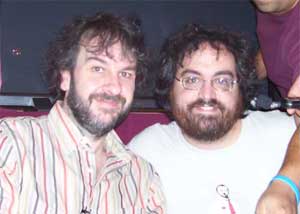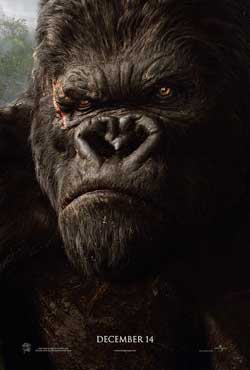 I hope Peter Jackson gets some sleep. The guy just seems exhausted. The last time I interviewed him was for The Two Towers, which means that he was right in the middle of all the Lord of the Rings business, and he still didn’t look as tired as he did last Thursday at New York City’s Regency Hotel.
I hope Peter Jackson gets some sleep. The guy just seems exhausted. The last time I interviewed him was for The Two Towers, which means that he was right in the middle of all the Lord of the Rings business, and he still didn’t look as tired as he did last Thursday at New York City’s Regency Hotel.
Newly
thin, Jackson sat in front of a room of online journalists and perked
himself up and answered our questions (a quick note – it was a great
room for the few people who actually asked questions. You’re going to
see versions of this interview elsewhere online since it was a press
conference, but the majority of the places that run it didn’t even ask
a single question) with good humor.
At the end of the press
conference I did something I never do – I asked Jackson to take a
picture with me. I am often confused for Jackson (Billy Boyd once
thought I was him, and he worked with Jackson for years. Coming out of
the Regency I was asked for my autograph, and they didn’t think I was
with CHUD.com). He was really gracious about it, which I think is what
best describes the guy. He’s one of the biggest filmmakers alive, and
yet he feels completely approachable and completely real. He’s one of
the greats, in every way possible.
Q:
A lot of people call you an auteur, and you do these films with
monstrous budgets and marketing campaigns. How hard is it to stay true
to your vision when you also have to serve this marketing machine?
Jackson: That’s
an interesting question. I don’t quite know what an auteur is. I never
quite understand that term because filmmaking is such a huge team
effort. I regard myself as being the final filter, so that anything
that ends up in the movie is there because it’s something that I would
think was cool in a movie somebody else had made. I very much tried to
make a film that I’d enjoy, but I’m open to ideas. I need a huge team
of people to help me and I try to encourage everyone to contribute as
much as possible. I think that’s the job of a director, really, to sort
of funnel all the creativity into one centralized point of being.
The
marketing is really something that happens with other people, and it’s
not something at all that I’m an expert in. I regard my job at the end
of the day is to make the best possible film I can. That’s really where
my job stops. Marketing people take over after that.
Q: You’ve lost a lot of weight in the past year or so. How do you feel?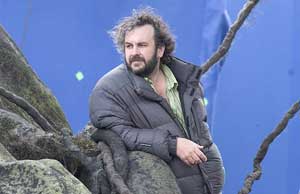 Jackson:
Jackson:
I’m exhausted. I’m absolutely tired. I felt fit for a while, but the
film is such a grueling marathon to do. We literally finished the movie
about ten minutes before we got on the airplane to come over here. We
were flying out of New Zealand at 9:30 in the morning and at 9 o’clock
I was at the visual effects house approving the last two or three shots
in the movie and then at 9:15 we dropped by the dub stage to look at a
couple of changes we had made to the dubbing and approved that, and
then we got on a plane. I haven’t enjoyed being healthy yet. I’m
absolutely shattered.
I haven’t really had a life. I’ve been making movies for ten years now, with the Lord of the Rings movies straight into Kong.
I’m very pleased that we did that because we were able to utilize the
great creative team we had assembled for the Lord of the Rings films.
One of the reasons why I wanted to make Kong very quickly – when the
opportunity to do Kong came up I grabbed it and wanted to do it fast –
because I wanted to keep this team together and be able to just channel
that creativity into another project.
People
didn’t really know it at the time, because you don’t talk about it, but
when we flew over to Los Angeles for the Oscars for Return of the King,
we were in a Kong production meeting the following day. We had a
Universal script meeting the day after the Oscars and then after that I
got on a plane and flew to New York and met with Fay Wray and we got a
tour of the top of the Empire State Building and took photos and
videotape on the top of the Empire State Building for building a set.
So we were already in the middle of doing Kong then. It’s been sort of
a continuous journey.
Q:
I was impressed at how faithful you were to the 1933 version. I thought
that you might be adding new action scenes, but you actually cut a
couple out, like the giant snake and the pterodactyl. How did you
decide what scenes to keep and what scenes to cut?
Jackson:
It’s a good question. It’s instinct to some degree, and it doesn’t
reflect a right or a wrong way of doing it since obviously every
filmmaker that would make a version of King Kong would do a completely
different film. I’ve been wanting to make this movie for a long, long
time, and I’ve had ideas and images in my head for years and years and
years. To met it wasn’t really that difficult. It wasn’t a sort of
particularly difficult situation to decide what should be in or out, I
was just really wanting to play down a movie in my head that would be
the kind of movie I would enjoy. Incidentally a few scenes we shot,
like we shot a version from the original film where they cross the
swamp and they’re attacked by a creature – we filmed that scene and
didn’t end up in the cut. Even though the movie is three hours longs,
there are quite a few scenes we filmed that didn’t make it into the
finished movie. So some of those things that you’re missing from the
original film, if we did an extended DVD – which hopefully we’ll get a
chance to do – you might see them popping up again.
Q: What was it about the ’33 King Kong that inspired you to make this movie, and to become a filmmaker?
Jackson: It did inspire me to become a filmmaker, absolutely. To such a profound effect that I saw the original Kong
I saw the original Kong
on TV when I was 9 on a Friday night and that weekend I grabbed some
plasticine and made a brontosaurus. I got my parent’s Super-8 movie
camera and tried to animate the plasticine dinosaur. Really it was a
moment in time when I just wanted to do special effects and do monsters
and creatures and ultimately led to becoming a filmmaker. I didn’t
really know what directing was when I was 9; it was more about monsters
at that stage.
The original Kong,
to me, is a wonderful piece of escapist entertainment. It has
everything that’s really cool about movies like a lost, remote island,
a giant ape, dinosaurs, and it also has this wonderful heart and soul.
It has this empathetic creature who, when I was 9 I cried at the end of
the movie, when he was killed on the Empire State Building. That moment
of shedding tears for him has stayed with me. That level of emotional
engagement and pure escapism is what I personally like about the
movies. Everybody goes to the movies for different reasons, has
different tastes, but for me that’s a great piece of escapist
entertainment.
Q: You brought a lot of the same team from Lord of the Rings, but you didn’t bring Howard Shore. Why? Also, what happened to that scene on the beach from the teaser?
Jackson:
Howard Shore was the original choice as composer. We’re very good
friends but it just came to the point where it seemed that our
sensibilities for the film were somewhat different. So we decided as
friends not to go down that road anymore. James Newton Howard is a
composer that we’ve obviously admired for a long time. We’d used some
of his earlier scores on some of the temp tracks we had, and his
sensibility and his feeling for the music seemed to relate really well
to the pictures that we shot.
We
also found an opportunity to pay homage to Max Steiner. We used some of
his original score in the Broadway show where Kong is put on display on
the stage. That was a nice way to keep an homage in a compartmentalized
way.
Q: And the beach scene?
Jackson:
The beach was like I was saying before; there’s a lot of scenes we shot
that didn’t make it into the movie. The movie’s three hours long – it
would probably be, if we included everything we shot – nearly four
hours long. There was a scene we had filmed and it had obviously been
used as an important part of the teaser trailer, but subsequently when
you’re dealing with this length of film we started to refine it and
look it at it and trim it down as you do. Again, there’s no real rules
about what you do. You just use your instincts as to the pacing of the
film and what is the minimal amount you can get away with to tell the
story. That scene didn’t make it in.
Q: How did you handle deciding how much to make Kong human versus making him an animal?
Jackson:
That’s a very good question. Obviously as a filmmaker you’re going to
manipulate the character as you need to to make the scenes work. I
certainly don’t deny that. But we did set out to base him on a real
gorilla as much as we could. We sat down at the beginning and asked,
‘What is Kong? What is he? Is he a monster, is he some sort of missing
link or aberration?’ We thought just making him a gorilla, a
silverback, as genuine as we possibly could, was a really good way to
go.
Everybody
thinks of him as being a gorilla anyway, although the various versions
of Kong have been a little different. So we studied silverback
gorillas; Andy Serkis, who obviously did a lot of the performance of
Kong for us, especially studied gorillas in the mountains and he went
up and tracked a group of them in the Rwandan mountains for a couple of
weeks. He spent a lot of time at the zoo studying their behaviour.
Everything in the movie is based on some form or another what a
silverback gorilla would do – but obviously with a little bit of
manipulation and cheating on behalf of the filmmakers. 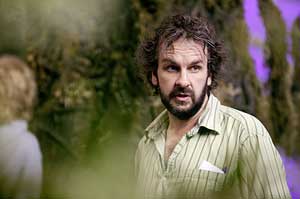 It
It
was interesting because we found that with silverback gorillas a lot of
personality and character is expressed through simplicity. I think that
probably studying gorillas so much, if it had any profound effect on
us, was simplifying his characterization and making him less emotive.
They don’t really give away a lot, gorillas. It’s all to do with eye
contact, and when they’re looking at you and looking away and their
body language. There’s not a lot of expression on their faces. So we
tried to reign it in and tried to pull it back as much as we possibly
could.
It’s
interesting. One of the interesting things about telling the story that
I have found in the last few months as we’ve been doing the animation,
kind of refining Kong, is the fact that I also didn’t want to fall into
the trap of making him too cute, and making his behaviour too cute. The
point in the story where we want the audience to empathize with Kong, I
didn’t want to stop him being dangerous. I didn’t want to stop him
being a wild creature who can kill characters that we got to know in
the story. It was interesting; I wanted people to empathize with him
but also keeping an edge to his character, keeping him wild and
unpredictable.
Q: What was most important to you when adapting the material, to put the Peter Jackson stamp on it?
Jackson:
What was most important was to make people be able to connect with
Kong, both in the way that he is portrayed, his performance and
character and also technically to make him believable. I knew going
into this that the movie was ultimately going to live or die on whether
you believed in Kong. All movies are a suspension of disbelief and you
hope people will engage in the film on some level and be prepared to go
along for the ride.
The
biggest concern that I had in terms of the film completely failing was
if Kong wasn’t believable. It was a difficult thing to pull off; it was
much more difficult than the Gollum character that we did on Lord of
the Rings. Gollum talked the whole time, and so much of his character
and so much of what he was and his role in the story was able to be
presented in his dialogue. You got to know him a lot through what he
said. Yet Kong is completely mute. He’s got so much screentime and so
many close-ups as a character. He’s not only mute but we deliberately
reigned in him and didn’t want him to express much. That was the
biggest challenge.
Q:
Can you talk about working with Naomi, and what it was like to get such
a performance out of her considering the fact that Kong wasn’t really
there.
Jackson:
Naomi was our first and only choice for the role. We responded to her
because she’s so honest as an actor. She doesn’t pretend in the films
that she does; she makes it as real as possible. She’s one of those
actors that, if she’s shedding tears in a scene, it’s because she’s
thinking of something that makes her cry. She’s really in the moment. I
don’t know what that is, I don’t know how she does it, but she’s
utterly believable. Which of course for this particular role, and this
particular movie, was essential for us.
Naomi
was also hugely helped by Andy Serkis. People think of Andy as the guy
who does motion capture for Kong, which he does. He’s in a suit, and he
acts out the role and we did all the motion capture of the character
with Andy and that was put into animation and then into performance.
But for me, as the filmmaker, possibly one of Andy’s greatest
contributions was being on set with the actors when they shot the
scenes. None of that was recorded; he wasn’t capture on set, that was
done in post-production. He wasn’t even filmed. Andy was there for the
other actors. And every single shot in the movie – and I don’t think
there’s an exception – every close-up of Naomi when she’s looking at
Kong, she’s actually looking at Andy. Andy would get himself into her
eyeline so that whenever she looked at Kong’s face, that’s where he
was. Up in a cherry-picker or up on a ladder or suspended on something
or up on a building, he was always there. And he was acting his heart
out as Kong. I think that was hugely beneficial for Naomi and the other
actors. It was really great for me because it was the beginning of us
creating Kong as a character. I was able to talk to Andy when we were
doing those scenes; it wasn’t just Naomi and me, it was Naomi, Andy and
me. It was the three of us. We were able to rehearse the scene, to
block the scene and to talk about how Kong would be. It was the
beginning of the creation of that character that would be taken to the
motion capture and then to the animation and finally to the film. It
was a huge contribution. More than what people would think coming from
Andy.
Q: A lot of people were first introduced to you with Lord of the Rings, or maybe Heavenly Creatures. But some of us first got to know you with Bad Taste and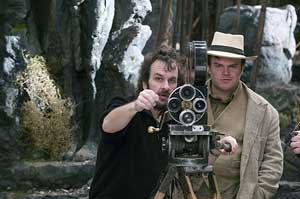 DeadAlive. Is that filmmaker still there inside of you?
DeadAlive. Is that filmmaker still there inside of you?
Jackson:
Oh absolutely. I hope to one day get to make another low budget horror
film. I certainly feel that, in a way now, I want to rest and
recuperate from the last ten years of filmmaking and be able to do some
more interesting things. I have low budget ideas and horror movies and
other types of films – it’s kind of weird but it’s only just recently
I’ve realized that for the last ten years I’ve had just two projects – Lord of the Rings and King Kong. We originally tried to make King Kong after The Frighteners, and that was 1995 into 96. And then when that got canned we went into Lord of the Rings and then back into King Kong again. So I’ve had two projects in the past ten years. It’s really an exciting time to rest up and think of new ideas.
Q: You’re just producing Halo, right?
Jackson: Yeah.
Q: Is there a director?
Jackson: Not yet. We’re talking to some people. We’re going to be shooting that next year.
Q:
My favorite scene in King Kong is the Central Park ice skating scene.
Can you talk about where the inspiration came from for that scene?
Jackson:
The thinking behind that scene is that didn’t want to go straight from
Kong escaping from the theater and then reunites with Ann, we didn’t
want to go directly up to the Empire State Building. We wanted to give
them a moment together to, in a way, fulfill the relationship and the
friendship that had started on the island. We just wanted to create a
quiet moment for the two of them. It was that thinking that led us to
creating the ice pond.
Q: Are you planning an Oscar party?
Jackson: I don’t think so. I don’t think these are the types of films that get Oscar attention.
Q: With Lord of the Rings you gave so much to the fans with the DVD. You’ve already said you might do an extended edition with Kong. How long would that edition be, and what else could we expect?
Jackson: I’m not quite sure. Unlike the Lord of the Rings
situation, when the first movie came out and the extended DVDs were
like a conclusion. We were doing the visual effects for the extended
DVDs right after the film was finished. In this case I think Universal
is waiting for the release of the film before they decide what
strategically they want to do. The tentative plan is to release the
movie as it is in theaters on DVD sometime next year. There’s been talk
of an extended cut, but I don’t know – we haven’t started working on it
yet.
If
I was putting in some other cool scenes we would have 30 or 40 minutes.
We have some dinosaur sequences and other stuff as well. It’s not just
drama and character stuff.
Q: Are you still doing The Lovely Bones?
Jackson: Yeah.
Q: Have you thought about who you are going to cast?
Jackson: No. We’re going to have a break first and then work on the script to that.
